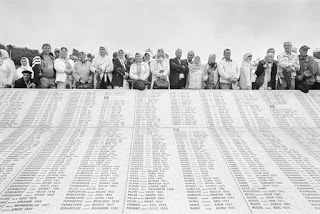Recently I laid over at Amsterdam’s Schiphol Airport, at which the Delta Airlines security agent checked my U.S. passport prior to boarding the plane to Minneapolis. Upon seeing my name and place of birth (Bosnia and Herzegovina), he asked in Serbian if I spoke “our language.” I responded with a “yes, of course,” and he completed the rest of the security procedure in ‘our language,’ revealing that he is a Serb who escaped to the Netherlands in 1991 because he did not want to have to fight the Bosniaks (Bosnian Muslims) or the Croats, as they are all “my people, our people.”
 Coincidentally, this random interaction occurred only two days after the 20th anniversary of the Srebrenica genocide, which took place on July 11, 1995. It made me ponder the use of the word ‘our’ in this brief conversation. We all clearly still have a lot in common: the primary, and perhaps strongest, connection being the language. ‘Our’ language, as the security agent used it, refers to Bosnian, Croatian, and Serbian. However, in ‘our’ language, there is still a contention over what happened in Srebrenica. Recently, Russia, Serbia’s ally, had vetoed the UN Security Council measure that labeled Srebrenica a genocide. Killing people based on their identity is a very basic definition of genocide, and denying that is to politicize it once again, and take away from the core of what this event should represent 20 years later, which is healing and hope for the future.
Coincidentally, this random interaction occurred only two days after the 20th anniversary of the Srebrenica genocide, which took place on July 11, 1995. It made me ponder the use of the word ‘our’ in this brief conversation. We all clearly still have a lot in common: the primary, and perhaps strongest, connection being the language. ‘Our’ language, as the security agent used it, refers to Bosnian, Croatian, and Serbian. However, in ‘our’ language, there is still a contention over what happened in Srebrenica. Recently, Russia, Serbia’s ally, had vetoed the UN Security Council measure that labeled Srebrenica a genocide. Killing people based on their identity is a very basic definition of genocide, and denying that is to politicize it once again, and take away from the core of what this event should represent 20 years later, which is healing and hope for the future.
Leading up to the anniversary itself, much of the world media had been referring to the genocide as the worst case of mass violence on the European continent since World War II. The systematic killing of over eight thousand Bosnian Muslim men and young boys in what was considered a UN safe haven shows nothing short of failure on the part of Europe for not holding up the ‘never again’ promise. What remains at stake now is the way we remember this horrific event based on the language used to label it. Srebrenica has been labeled a crime, and a massacre, but why not genocide?
During the 20th anniversary commemoration ceremony, President Bill Clinton begged the international community to not treat this as a mere monument, but as a sacred trust for healing, implying that Srebrenica shouldn’t be a place of forgetting but of active remembering. Therefore, education is crucial to its memory. The members of various refugee communities scattered around the world have already done a lot in this respect, but education must continue for the sake of future generations of not only Bosniaks, but also Serbs and Croats. After all, it is something that marked all of “us.” We also shouldn’t forget that Bosnia is made up of many ‘little Srebrenicas’ that amount to many more victims and their grieving families. Ultimately, what Srebrenica must remind us of is our common humanity, and that conflicts rooted in identity continue to be a struggle for the world.
In April of this year, the Center for Holocaust and Genocide Studies hosted an international conference on the 100 years of the Armenian Genocide, bringing the struggle over its acknowledgement to the forefront. For many like myself, this served as a reminder of the politicization around Srebrenica as well. The question is then, are we going to treat Srebrenica the same way in the upcoming century?
Erma Nezirevic is a Ph.D. candidate in Hispanic Literatures and Cultures at the University of Minnesota – Twin Cities. She specializes in 20th and 21st century Iberian literatures and cultures. Her dissertation studies the way Spain evokes the Balkan Wars of the 1990s in literature and other cultural production such as photography, and how in turn that provides a political, social and cultural understanding of Spain itself. Erma currently works in affiliation with the Center for Holocaust and Genocide Studies, where she coordinates the HGMV Workshop.

Comments